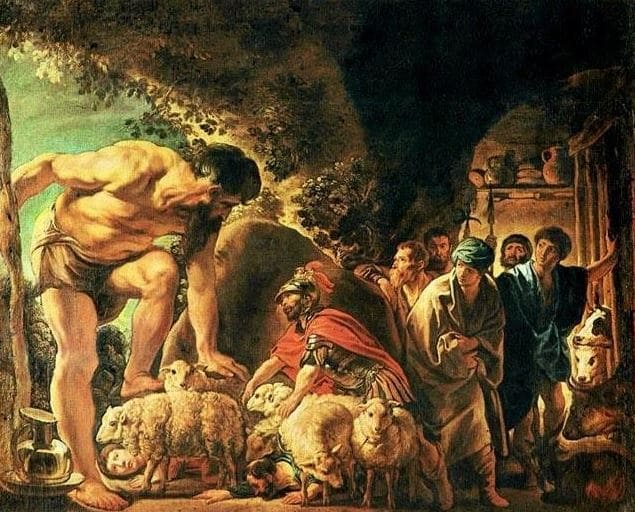Introduction
People’s personalities can evolve with time depending on their encounters. As a result, literature authors have utilized many characters who change themselves due to experiences in their plays and poems. For instance, Homer’s epic poem, Odyssey, has different characters who have transformed themselves due to happenings that changed their way of thinking. In this respect, Odysseus’ evolution is evident throughout the Odyssey as he transforms from selfish to selfless, a troublemaker to a peace seeker, and a captive to a king.
Selfish to Selfless
Odysseus transforms from being selfish to being human as he travels home to Ithaca after the end of the Trojan War. Basically, selfish individuals assume that everything revolves around them (Guajardo 71). In this case, they constantly act based on their interests and disregard how their actions might impact others. As a leader, Odysseus was responsible for ensuring that the soldiers who had accompanied him to the Trojan War could safely return to their homes. However, his love for adventure influenced them to make several stopovers, leading to soldiers’ death. At Aeaea, Odysseus becomes the lover of Circe and starts feeling comfortable until his people ask him to think of his home and native land (Homer 170). This scenario shows that Odysseus thinks of only himself. However, Odysseus shows his urge to get back to his native land when he is warmly welcomed at Phaeacian to the extent that he tells Alcinous, Phaeacian’s king, that he is comfortable abiding by his conditions as long as he promises to get him home (Homer 186). Thoughts of returning home justify that Odysseus thinks of his native land and his family. Therefore, Odysseus transforms from being self-centered to a person who thinks about others in the Odyssey.

A Troublemaker to a Peace Seeker
Odysseus evolves from being a trouble causer to an individual who pursues peace in the Odyssey. Poseidon was angry at Odysseus because he had blinded his son, the cyclops Polyphemus (Homer 222). He blinded Polyphemus and ran away, influencing Poseidon to be irritated. Odysseus also recognizes that Poseidon is the god of the sea, and he mockingly shouts at him as he flees after blinding the cyclops. Emotions associated with humiliation, contempt, and hatred are essential in causing long-term violent conflicts (Grunewald and Hedges 4). Poseidon’s vengeance resulted from Odysseus’ humiliation and influenced the god to utilize sea waves to destroy some of his ships. However, Odysseus seeks peace after returning home and reclaiming his throne. Hence, the main character’s intentions to end his grudge against Poseidon justify his evolution to a peace seeker.
A Captive to a King
Odysseus transforms from being a captive to a king in the Odyssey. For example, Athena intervened in Odysseus’ captivity after being moved by his long ordeal (Homer 77). In this case, he has been held captive by the nymph Calypso for seven years. As an intruder in other people’s lands, Odysseus plays by her rules to ensure that he can move to his home safely. Moreover, transformational leaders utilize intellectual stimulation, motivation and inspiration, individualized consideration, and idealized influence to accomplish superior results (Specchia et al. 2). Odysseus pretends to be a beggar as he plots how to reclaim his throne with the help of his son, Telemachus. He was determined to move back to his native land despite encountering challenges. Therefore, Odysseus complies with rulers of foreign lands to ensure that he is not killed, even if it means being held captive.
Conclusion
As the main protagonist in this explication essay, Odysseus changes himself from being selfish to altruistic, a troublemaker to a peace seeker, and a captive to a king after many events throughout the Odyssey. At first, he concentrates on himself and makes decisions that impact other soldiers. However, he later considers other opinions and remains determined to return to his native land. Besides, Odysseus intimidates Poseidon, but he tries to retain peace with him later in the poem. In turn, Odysseus transforms from being a captive to a king, justifying his evolution in the Odyssey.
Works Cited
Grunewald, Philipp, and Mark Hedges. “An Integrative Approach to Building Peace Using Digital Media.” Journal of Peacebuilding & Development, vol. 16, no. 2, 2021, pp. 1-15, doi: 10.1177/1542316620966256.
Guajardo, Ivan. “Self-Love in Logic-Based Therapy.” International Journal of Philosophical Practice, vol. 7, no. 1, 2021, pp. 61-78, doi: 10.5840/ijpp2021715.
Homer. The Odyssey. Oxford University Press, 2016.
Specchia, Maria Lucia, et al. “Leadership Styles and Nurses’ Job Satisfaction. Results of a Systematic Review.” International Journal of Environmental Research and Public Health, vol. 18, no. 4, 2021, pp. 1-15, doi: 10.3390/ijerph18041552.


